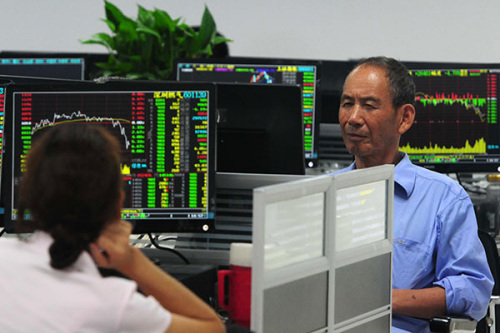
Stock investors at a brokerage in Jiujiang, Jiangxi province. The Shanghai Composite Index dropped 5.2 percent to 4,053.70 points on Wednesday. (Photo/China Daily)
Uncertainties still remain amid wild fluctuations, say market sources
Share prices plunged on Chinese bourses on Wednesday, after a brief rally on Tuesday, amid heavy volatility despite efforts by the government to prop up the flagging market sentiment.
The benchmark Shanghai Composite Index sunk 5.23 percent to finish at 4,053.70 points on turnover of 838.07 billion yuan ($137.39 billion). The Shenzhen Component Index dropped 4.79 percent to close at 13,650.82 points on turnover of 691.16 billion yuan.
Though investor sentiment continues to be at a low, there has also been speculation that policymakers may consider more measures to shore up the sagging economy, after share prices dropped by more than 20 percent in two weeks.
According to a survey jointly conducted by the Financial Research Center of the Fudan University and two other financial information platforms in Shanghai, about 50 percent of the respondents expressed the view that the capital market needs more measures to maintain its bullish trend. About 20 percent of the respondents believe that the market will adjust itself through corrections. The survey polled 3,400 retail investors and 600 professionals working with institutional investors.
Uncertainties still remain amid wild swings and it may take a while for the market to consolidate, said a research report from Founder Securities.
Meanwhile the China Securities Regulatory Commission on Wednesday strongly denied reports about an impending leadership change at the market regulator. Media reports had earlier indicated that Xiao Gang, the chairman of CSRC, had been removed from his position.
In other market-related developments, the China Financial Futures Exchange released a statement on Wednesday saying that reports about foreign institutional investors conducting short sales in the A-share market throughindex futures trading was not correct.
The CFFEX statement said it is technically impossible for foreign institutional investors to short sell a specific company's share or a sector's shares in the A-share market. Regulators have also been keeping a close watch on the short selling patterns, the statement said.
Despite the volatility, the market is likely to rebound soon as the A-share market is further opening up to the global capital market with the mainland-Hong Kong mutual recognition of funds program that started on Wednesday.
Analysts said the short-term impact of the mutual recognition program may be limited, but it would be significant in the long run as it will channel more capital into the A-share market as investors trade qualified equity-backed funds under the program.
The program will allow qualified Hong Kong-domiciled funds to be sold in the mainland mass-market and for mainland funds to be sold in Hong Kong.
The initial quota of fund flow is 300 billion yuan in each direction. About 100 funds in Hong Kong and 850 funds in the Chinese mainland are expected to be qualified for participation.
David Leung, managing director of the wealth management department at Standard Chartered Bank (China) Ltd, said the program is an indication that China is opening up the capital market in a steady manner and this will effectively expose mainland investors to the global capital market.
Allocating capital globally will help investors diversify risks, which is particularly significant for investors amid the currently volatility, said Leung.
At the same time, foreign capital can also participate in the A-share market by trading qualified equity-backed or hybrid funds. Since the Hong Kong market was closed on Wednesday, qualified funds can apply for participation from Thursday, market sources said.
The regulators have also increased the quotas for the Qualified Foreign Institutional Investor program and Renminbi Qualified Foreign Institutional Investor program. By the end of June, the total quota for QFII has been increased to $75.54 billion, while the RQFII quota has gone up to 390.9 billion yuan.
















































